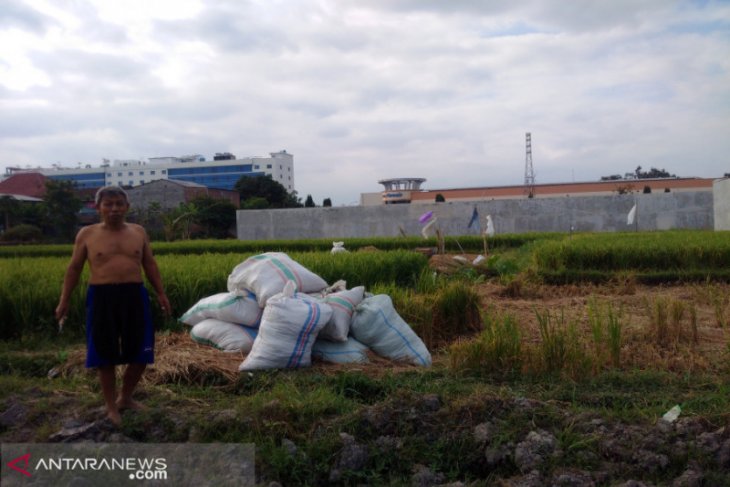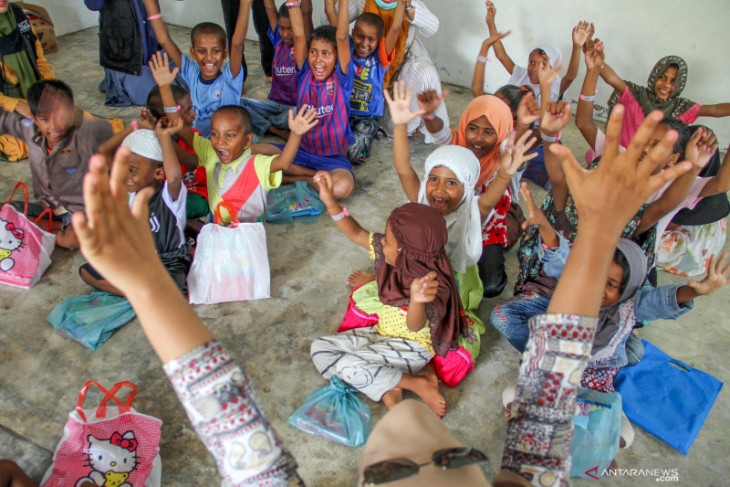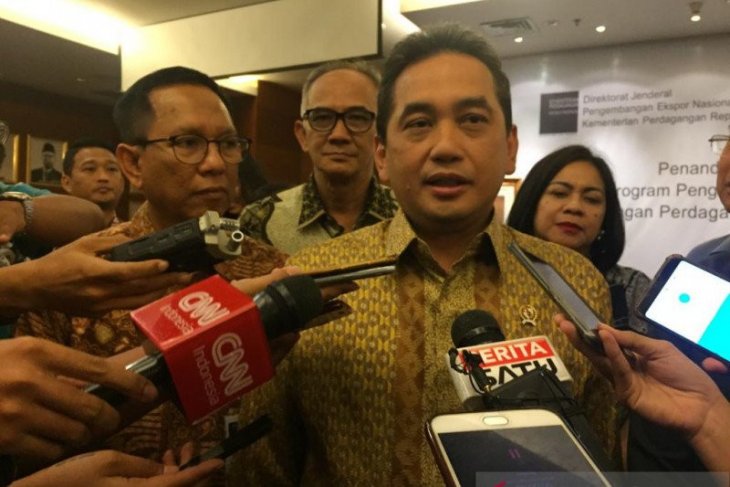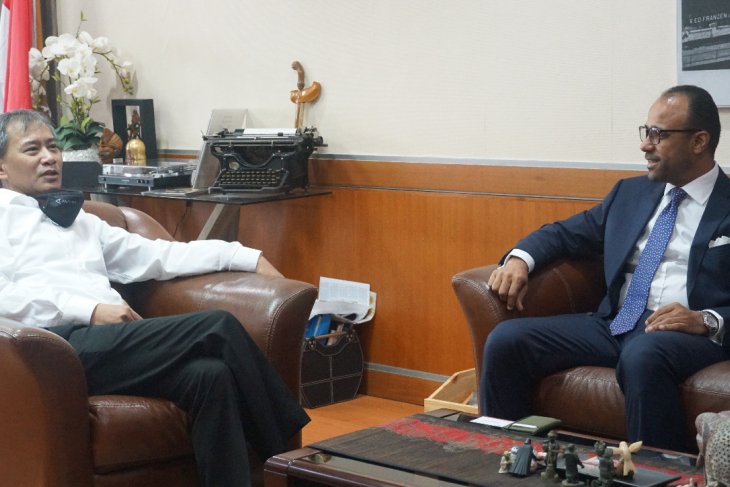Live Streaming
Program Highlight
Company Profile
July
Solo-Yogyakarta toll road construction to commence in November 2020
Written by Ani Hasanah A farmer in Ngawen Hamlet, Maguwoharjo Village, Depok Sub-district, Sleman District, Yogyakarta Province, harvests rice in his paddy field. Local farmers expressed concerns over the Yogyakarta-Solo toll road project. ANTARA/Victorianus Sat Pranyoto
A farmer in Ngawen Hamlet, Maguwoharjo Village, Depok Sub-district, Sleman District, Yogyakarta Province, harvests rice in his paddy field. Local farmers expressed concerns over the Yogyakarta-Solo toll road project. ANTARA/Victorianus Sat Pranyoto
Central Java Governor Ganjar Pranowo revealed that construction of the 50-kilometer-long toll road connecting the cities of Yogyakarta and Surakarta in Central Java would commence in November 2020.
State-owned construction firm PT Adhi Karya confirmed in a report Pranowo received on Thursday evening that construction of the Solo-Klaten section will start from Prambanan, he notified local journalists in Semarang, Central Java, Friday.
Pranowo claimed to have no knowledge of when this toll road construction project would be completed though he projected its completion in two years.
Speaking in connection with the Solo-Yogyakarta toll road construction project, which is part of the Trans-Java Highway, Pranowo affirmed that he maintained sound coordination with the Yogyakarta provincial government.
Work on the toll road construction project continues amid the ongoing novel coronavirus pandemic.
The Public Works and Housing Ministry has highlighted that the work to construct 15 toll road sections in several Indonesian provinces would be completed this year, with five of them inaugurated in June and July.
"Toll road sections, spanning 297 kilometers, are ready to be inaugurated this year," Director General of Highways at the Public Works and Housing Ministry Trisasongko Widianto noted at a recent videoconference organized by the Indonesian Chamber of Commerce and Industry (KADIN).
The toll road sections ready for inauguration in June and July are Section 4 of Banda Aceh-Indrapuri-Blang Bintang, spanning 14 kilometers; Section 1-6 of Pekanbaru-Kandis-Dumai, reaching 131 km; Section 2 of Depok-Antasari, totaling six km; Section 1A of Cimanggis-Cibitung, spanning three km; and Section 1 and Section 2A of Manado-Bitung, reaching 21 km.
Widianto also drew attention to 12 toll road sections also ready to be auctioned this year.
The total length of those toll road sections reaches 669 kilometers, while their investment expenses were estimated to reach Rp242 trillion. The toll road sections ready to be auctioned include the Gedebage-Tasikmalaya-Cilacap, Access Road of Patimban, Jogja-Bawen, Solo-Yogyakarta-NYIA, and Semarang's Harbour Toll Road.
Public Works and Housing Minister Basuki Hadimuljono has earlier stated that nine other toll road projects were ready for the pre-qualification stage of auction in June and July 2020.
Furthermore, the ministry had formulated a plan to auction a multi-lane free flow (MLEF)-based cashless transaction of the toll road system project for the toll road sector, he remarked, adding that four toll road sections will become operational by June-end to support Indonesia's economic recovery efforts.
Since the first and second leadership terms of President Joko Widodo (Jokowi), infrastructure has been the prime focus, with notable extension of toll roads being testament to it.
The Public Works and Housing Ministry noted that during the first leadership term of President Jokowi, at least 941 kilometers of toll roads and 3,423 kilometers of national roads were constructed.
Work on the Trans-Java Highway, connecting the ferry port in Merak, Banten Province, to Surabaya, the capital city of East Java Province, is complete, thereby reducing the travel time and current logistics costs.
As part of the central government's prioritized development projects, the toll roads are not merely constructed in Java, but they are also built outside the island, such as Sumatra, Kalimantan, and Sulawesi.
In Sumatra Island, several sections of the Trans-Sumatra Toll Road have been completed, while the government is eyeing to complete entire sections in 2024. (ANTARA)
July
Rohingya Refugees Shifted to New Shelter in Lhokseumawe
Written by Ani Hasanah
Rohingya children who are currently being sheltered in Aceh Province. (ANTARA FOTO/Rahmad/aww)
The Indonesian government on Friday afternoon shifted 99 Rohingya refugees, rescued by three Acehnese fishermen in June this year, from the old immigration office in Lhokseumawe, Aceh, to the city’s Meunasah Mee vocational training center.
Their move was carried out under strict implementation of COVID-19 protocols, Foreign Minister Retno Marsudi told journalists at a virtual press conference in Jakarta on Friday.
The refugees were rescued by three Acehnese fishermen, for humanitarian reasons, after their boat was stranded in the waters off Seunuddon, North Aceh, on June 24, 2020.
The Indonesian government has provided hygiene kits and logistics as well as health services to the refugees, the minister said.
It has also dispatched medical workers to take care of them at their new accommodation, she added.
Since July 5, 2020, officials from the United Nations High Commissioner for Refugees (UNHCR) have been registering the 99 refugees.
As of July 10, some 90 refugees have been registered by the UN agency. The registration process is expected to be completed by July 11.
During the registration, UNHCR officials found 25 of the refugee children were traveling without their parents. But, 13 of them were accompanied by their guardians, Retno Marsudi said.
"Twelve other children have been reunited with their uncles or aunts boarding the damaged boat," she said, adding that the Indonesian Red Cross (PMI), assisted by the International Committee of the Red Cross (ICRC) has conducted a healing program for them.
The PMI and ICRC also helped trace the children's family members so they could be reunited. Their relatives were tracked in Malaysia and Bangladesh, the minister added.
The EU's Foreign Affairs and Security Policy spokesperson, Nabila Massrali, has praised Indonesia's decision to provide a safe-landing and humanitarian assistance to the Rohingya refugees.
"The rescue of Rohingya refugees who face dire conditions is a tribute to international law and proves the generosity of the people and government of Indonesia," Nabila Massrali said in a statement on Thursday.
In cooperation with Indonesian authorities, the UNHCR, and other humanitarian organizations, the EU has pledged to mobilize humanitarian support to address the most urgent basic needs of the affected refugees. (ANTARA)
July
Trade Deal to Cut Indonesia's Trade Deficit with Australia: Minister
Written by Ani Hasanah
Indonesian Trade Minister Agus Suparmanto. (ANTARA/Mentari Dwi Gayati/sh)
Trade Minister Agus Suparmanto said the Indonesia-Australia Comprehensive Economic Partnership Agreement (IA-CEPA) is expected to help slash Indonesia’s trade deficit with Australia, which had reached US$3.2 billion in 2019.
"Indonesia still recorded a trade deficit of US$3.2 billion in 2019 with Australia. This is quite a big deficit, hence the IA-CEPA is expected to curb the deficit," the minister said at a virtual press conference in Jakarta on Friday.
While Suparmanto did not elaborate the target for the reduced deficit, he said there would be a significant decline in the trade gap in 2021.
In keeping with the IA-CEPA, Australia has eliminated 6,474 tariffs on imports from Indonesia since the agreement took effect on July 5 this year.
Meanwhile, Indonesia will slash 94.6 percent of the trade tariff on Australian exports to Indonesia.
The minister said the government has ensured protection for some products that are considered sensitive for the country.
"There may be some questions on how the Indonesian government would protect some products considered as sensitive for Indonesia. This agreement has the mechanism of TRQ, or Tariff Rate Quota, where preferential tariff will be imposed for a certain volume of exports," Suparmanto said.
However, he continued, non-preferential tariff will be imposed if the export volume exceeds the quota.
"The agreement has excluded sensitive products, such as rice and alcoholic beverages," he added.
According to the minister, Australia's exports to Indonesia are primarily raw materials, such as wheat, coal, iron ore, aluminum, raw sugar, milk, and cream.
Despite a lower population of 25 million compared to Indonesia's 270 million, Australia's demand for Indonesian products is relatively high.
Australia's Gross Domestic Product (GDP) has been recorded at US$57 thousand per capita, which is 15 times higher than Indonesia's GDP, which is pegged at US$3,800 per capita. Australia also has a wide trade and economic cooperation network, Suparmanto said. (ANTARA)
July
UAE, Indonesia Relations will Continue to Grow Rapidly: ambassador
Written by Ani Hasanah
The United Arab Emirates Ambassador, Abdullah Salem Obeid Al Dhaheri, met with president director of LKBN Antara, Meidyatama Suryodiningrat, at Wisma Antara in Jakarta on Thursday (July 9, 2020). At the meeting, both stressed the importance of strengthening relations between the UAE and Indonesia.
The United Arab Emirates Ambassador to Indonesia Abdulla Salem Obaid Salem Al Dhaheri has said he is optimistic bilateral cooperation between the UAE and Indonesia would continue to grow at a rapid pace in several fields.
"My main task is to ensure that bilateral relations between the United Arab Emirates and Indonesia continue to develop rapidly in various sectors," Ambassador Al Dhaheri said at Wisma Antara on Thursday (July 9, 2020).
He made the statement after a meeting with the president director of LKBN Antara, Meidyatama Suryodiningrat, at Wisma Antara in Jakarta on Thursday.
Ambassador Al Dhaheri said the United Arab Emirates and Indonesia have enjoyed very close bilateral relations so far.
This is evidenced by the visits made by the leaders of the two countries in July last year and January this year.
In July, 2019, the crown prince of Abu Dhabi, His Highness Sheikh Mohammed bin Zayed Al Nahyan, had visited Indonesia.
During his visit, the UAE and Indonesia had signed 12 cooperation agreements, in addition to a number of investment agreements worth US$9 billion.
Then, in January, 2020, President Joko Widodo had held a bilateral meeting with the crown prince of Abu Dhabi, who is also the deputy supreme commander of the UAE armed forces. The meeting was held at the Qasr Al Watan Presidential Palace in Abu Dhabi, UAE.
At the meeting between President Widodo and His Highness Sheikh Mohammed bin Zayed Al Nahyan, 16 agreements were signed by Indonesia and the United Arab Emirates.
"We will definitely do what is needed to ensure that the agreement reached by both parties can be followed up. It is my duty to follow up on the agreement," Ambassador Al Dhaheri stated.
During the meeting with president director of LKBN Antara, the ambassador said the United Arab Emirates was not only focusing on the oil sector for generating state revenue, but also tourism, culture, trade, commerce, finance, and technology sectors.
The tourism, cultural, trade, commercial, financial, and technology sectors are now the mainstay of the country's income, Ambassador Al Dhaheri said. (ANTARA)


